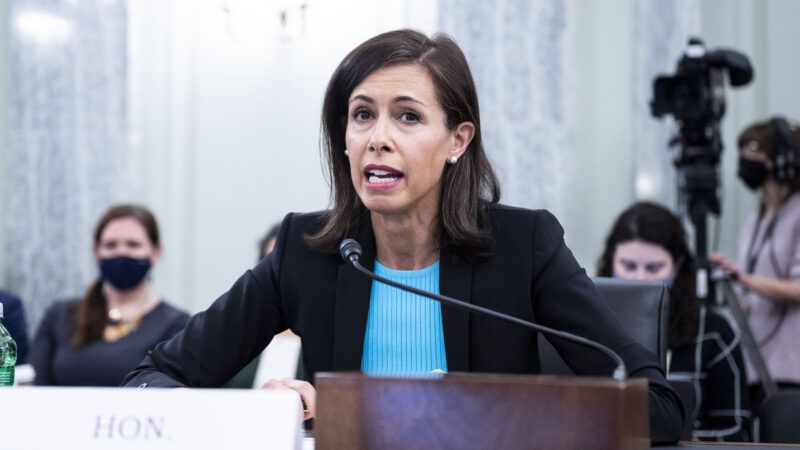FCC Set To Reinstate Net Neutrality Rules That Seem More Unnecessary Than Ever
Net neutrality rules have been instituted and repealed multiple times in the past 15 years, and yet internet use has thrived in each scenario.

Of all the modern technological advances, the internet is certainly one of the most impressive. For most consumers, it went from an inscrutable concept to a ubiquitous presence within a quarter of a century.
We owe much of that explosive growth to the freedom and openness that early internet adopters enjoyed thanks to minimal government regulation.
This week, the Federal Communications Commission (FCC) will likely reinstate net neutrality rules to promote fairness in internet access. But these rules seem less and less necessary all the time, while threatening the very openness that built the internet in the first place.
Net neutrality refers to a regulatory framework where internet service providers (ISPs) "cannot block or throttle internet traffic, or prioritize their business partners or other favorite web sites or services," according to the Mozilla Foundation. "For example, ISPs can't slow down your connection to Netflix or Zoom, or speed up a connection to their own favored streaming or video conferencing site. Without Net Neutrality, providers could control what people see and do online, not the consumers who pay for their Internet connections."
Net neutrality regulations have come and gone under each presidential administration of the past 15 years: The Obama administration implemented rules in 2010 which were struck down in 2014; in 2015, then-FCC Chair Tom Wheeler proposed new rules under which the agency would regulate the internet more aggressively, as a public utility rather than an "information service." Then in 2017, the FCC under the Trump administration voted to revert back to the pre-2014 rules.
This week, the agency is expected to vote to reimpose net neutrality. If adopted, the "Safeguarding and Securing the Open Internet" draft order would effectively undo the 2017 vote that undid the 2015 rules that replaced the overturned 2010 rules.
But net neutrality is not necessary to safeguard fair and open internet access. The proof is in the numbers: "From 2012 to 2014, the number of Americans without access to both fixed terrestrial broadband and mobile broadband fell by more than half," the FCC reported in February 2018. "But the pace was nearly three times slower after the adoption of the 2015 Title II Order, with only 13.9 million Americans newly getting access to both over the next two years."
As the editorial board of The Wall Street Journal noted today, that trend picked up again after the 2017 repeal went into effect: "By the end of 2019, 94% of Americans had access to high-speed fixed and mobile broadband, up from 77% in 2015. In 2022 broadband builders laid more than 400,000 route miles of fiber, more than 50% more than in 2016."
Regarding the Mozilla Foundation's admonition that without net neutrality, ISPs could "slow down your connection to Netflix or Zoom," the COVID-19 pandemic should dispel that notion: Netflix traffic surged exponentially during lockdowns, with the Association of Chartered Certified Accountants calling the streamer "one of the few 'winners'" of the pandemic.
Zoom use similarly skyrocketed as both adults and children shifted to remote work and school, with the service going from 10 million daily meetings in December 2019 to more than 300 million in April 2020. If ever there was a time for ISPs to throttle people's Netflix and Zoom use, that would have been it.
In its op-ed, The Wall Street Journal charged that the proposed rules are not about fairness or access, but control.
"[FCC Chair Jessica] Rosenworcel's new justification is that 'loopholes' in FCC oversight have left the internet vulnerable to national-security, cyber-security and privacy threats," the editorial reads. "The Biden Administration notes in an FCC filing that U.S. security agencies already have and 'exercise substantial authorities with respect to the information and communications sectors'…. The draft order doesn't argue that the FCC needs Title II to protect Americans, only that it 'furthers' and 'enhances' the FCC's existing power with 'a broad grant of rulemaking authority to "prescribe such rules and regulations as may be necessary in the public interest to carry out the provisions of this chapter."' In other words, Ms. Rosenworcel is reimposing Title II because she wants sweeping political control over the internet."
Rosenworcel has made similar claims in the past. "As a result of the previous FCC's decision to abdicate authority, the agency charged with overseeing communications has limited ability to oversee these indispensable networks and make sure that for every consumer, their access is fast, open, and fair," she said last year. "I think that's not right."
Perhaps instead what's not right is looking at a free and open internet that has expanded information access to countless people and deciding that a government agency needs to throw its weight around.


Show Comments (23)